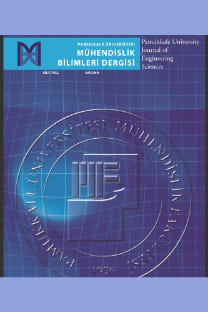Seri elastik eyleyiciler için mekanik tasarım süreçleri
Bu makalede
tork kontrollü robot eklem tahriki için robotik literatüründe sıkça tercih
edilen seri elastik eyleyici (SEE) üniteleri için geliştirilen tasarım
süreçleri konu edilmiştir. Bilgisayar destekli tasarım ve benzetim
çalışmalarının anlamlı bir bütünlük teşkil edecek şekilde entegrasyonunu içeren
bu süreçlerin çıktıları ayrıca deneysel çalışmalar ile de sınanmış olup
ünitenin en kritik parçası olan burulma yayı üzerinde önemle durulmuştur. SEE
ünitesinin ilk sürümünde karşılaşılan zorluklar deneysel çalışmalar ışığında
paylamış ve robotik sistemlerin tahrikine hazır ikinci sürüm ile ilgili
sonuçlar ile makale sonlandırılmıştır.
Anahtar Kelimeler:
Seri elastik eyleyici, Sonlu elemanlar metodu, Burulma
Mechanical design procedures for series elastic actuators
This
article presents the mechanical design procedures that were devised for the
development of series elastic actuators (SEA), a type of actuators that enable
joint level torque control of robots. These procedures include the synergistic
combination of studies that were conducted via simulation and CAD software
whose outcomes were experimentally verified, with a special emphasis on the torsional
spring, the most crucial element in the unit. Technical difficulties and
shortcomings that were encountered in the first version of the actuator are
disclosed with the help of experimental data. The article is concluded with the
results from the ready-to-use 2nd version of our SEA.
Keywords:
Series elastic actuator, Finite element methods, Torsion,
___
- Ajoudani A, Zanchettin A, Ivaldi S, Albu-Schaeffer A, Kosuge K, Khatib O. “Progress and prospects of the physical human-robot collaboration”. Autonomous Robots, 42(5), 957-975, 2018.
- Wang, KJ, Sun, M, Xia, R, Mao, ZH. “Human-robot symbiosis framework on exoskeleton devices”. IEEE International Conference on Industrial Technology, Taipei, Taiwan, 14-17 March 2016.
- Van Ham R, Sugar TG, Vanderborght B, Hollander KW, Lefeber B. “Compliant actuator designs”. IEEE Robotics and Automation Magazine, 16(3), 81-94, 2009.
- Pratt GA, Williamson MM. “Series elastic actuators”. IEEE/RSJ International Conference on Intelligent Robots and Systems, Pittsburgh, USA, 5-9 August 1995.
- Veneman JF, Ekkelenkamp R, Kruidhof R, van der Helm FCT, van der Kooij H. “A series elastic- and bowden-cable-based actuation system for use as torque actuator in exoskeleton-type robots”. International Journal of Robotics Research, 25(3), 261-281, 2006.
- Paine N, Oh S, Sentis L. “Design and control considerations for high-performance series elastic actuators”. IEEE Transactions on Mechatronics, 19(3), 1080-1091, 2014.
- Sariyildiz E, Chen G, Yu H. “An acceleration-based robust motion controller design for a novel series elastic actuator”. IEEE Transactions on Industrial Electronics, 63(3), 1900-1910, 2016.
- Tsagarakis NG, Morfey S, Medrano-Cerda G, Li Z, Caldwell DG. “Compliant Humanoid COMAN: Optimal Joint Stiffness Tuning for Modal Frequency Control”. IEEE International. Conference on Robotics and Automation, Karlsruhe, Germany, 6-10 May 2013.
- Laffranchi M, Tsagarakis NG, Cannella F, Caldwell DG. “Antagonistic and series elastic actuators: a comparative analysis on the energy consumption”. IEEE/RSJ International Conference on Intelligent Robots and Systems (IROS), Kobe, Japan, 10-15 October 2009.
- Kormushev P, Ugurlu B, Calinon S, Tsagarakis NG, Caldwell DG. “Bipedal walking energy minimization by reinforcement learning with evolving policy parameterization”. IEEE/RSJ International Conference on Intelligent Robots and Systems, San Francisco, USA, 25-30 September 2011.
- Ugurlu B, Havoutis I, Semini C, Kayamori K, Caldwell DG, Narikiyo T. “Pattern generation and compliant feedback control for quadrupedal dynamic trot-walking locomotion: experiments on RoboCat-1 and HyQ”. Autonomous Robots, 38(4), 415-437, 2015.
- Zinn M, Khatib O, Roth B, Salisbury JL. “Playing it safe [human-friendly robots]”. IEEE Robotics and Automation Magazine, 11(2), 12-21, 2004.
- Mehling JS, Holley J, O’Malley MK. “Leveraging disturbance observer based torque control for improved impedance rendering with series elastic actuators”. IEEE/RSJ International Conference on Intelligent Robots and Systems (IROS), Hamburg, Germany, 28 September-02 October 2015.
- Parmiggiani A, Metta G, Tsagarakis NG. “The mechatronic design of the new legs of the iCub robot”. IEEE Conference on Humanoid Robotics, Osaka, Japan, 29 November-01 December 2012.
- Yildirim MC, Sendur P, Bilgin O, Gulek B, Yapici GG, Ugurlu B. “An integrated design approach for a series elastic actuator: stiffness tuning, fatigue analysis, thermal management”. IEEE International Conference on Humanoid Robots, Birmingham, United Kingdom, 5-7 November 2017.
- Tuttle TD, Seering WP. “A nonlinear model of a harmonic drive gear transmission”. IEEE Transactions on Robotics and Automation, 12(3), 368-374, 1996.
- Negrello F, Garabini M, Catalano MG, Malzahn J, Caldwell, DG, Bicchi A, Tsagarakis NG. “A modular compliant actuator for emerging high performance and fall-resilient humanoids”. IEEE International Conference on Humanoid Robots, Seoul, Korea, 3-5 November 2015.
- ISSN: 1300-7009
- Başlangıç: 1995
- Yayıncı: PAMUKKALE ÜNİVERSİTESİ
Sayıdaki Diğer Makaleler
Çapraz sevkiyatta kamyon çizelgeleme problemi için çözüm yaklaşımları
Yapıştırma bağlantılı kompozitlerde yapıştırma geometrisininin gerilme dağılımına etkisi
Biyodizel kaynaklı korozyon ve bozunma: Bir inceleme
Muhammet Kaan YEŞİLYURT, İlhan Volkan ÖNER, Efe Çetin YILMAZ
Gerçek bir sınav çizelgeleme problemi için iki aşamalı çözüm yaklaşımı
Rahime SANCAR EDİS, Emrah Bünyamin EDİS
Fe3O4/FeO/CoNi kompozit malzemenin sentezi ve manyetik özelliklerinin incelenmesi
Bayes ağları ile futbol analitiği: FutBA modeli
Gezgin satıcı probleminin melez akışkan genetik algoritma (MAGA) kullanarak çözümü
Spor giyim sektöründe marka tercihlerine ve tercih nedenlerine saklı Markov modelinin uygulanması
